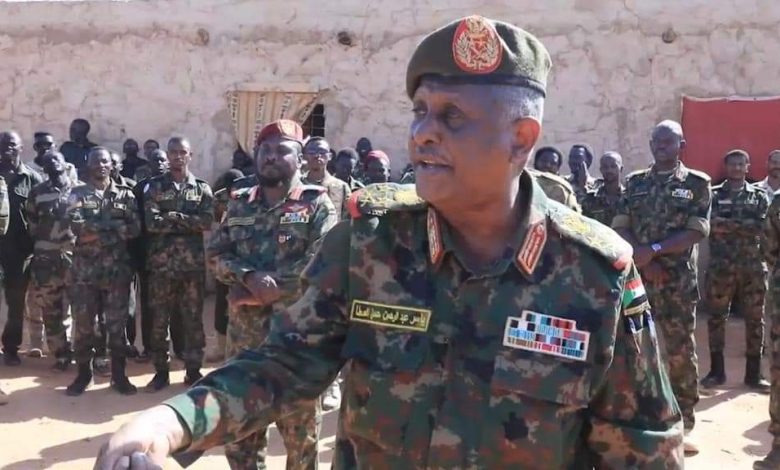General Yasser Al-Atta: “The Veteran Warrior”

Sudan Events – Agencies
First Lieutenant General Yasser Al-Atta is one of Sudan’s most prominent military leaders. He has played a pivotal role in the country’s political and military landscape. His character was shaped within a military environment, contributing to his strong leadership traits. Al-Atta has held key positions in the Sudanese Armed Forces and participated in significant military operations, gaining extensive experience, particularly in conflict zones.
He was a prominent figure in Sudan’s political transitions, especially during the fall of President Omar al-Bashir’s regime in 2019, when he became a member of the Transitional Military Council and later the Sovereignty Council.
Early Life and Background
Yasser Abdel Rahman Hassan Al-Atta was born in 1962 in Wadi Bashara, in Sudan’s River Nile State, into a family with a strong military background.
His uncle, Major Hashim Al-Atta, was a close associate of former President Jaafar Nimeiri but later defected and attempted a coup in collaboration with the Sudanese Communist Party. The coup failed, leading to his execution in 1971 along with several other military and political leaders.
Yasser Al-Atta’s family later moved from Wadi Bashara to Hosh Al-Atta in the Omdurman district of Beit Al-Mal, where he grew up in a diverse and historic community.
Education and Military Training
In the early 1980s, Al-Atta joined the Sudanese Military College as part of the 33rd intake. Sudanese media reported that during his entrance interview, then-President Nimeiri asked him if he would execute him in the event of another coup, referring to what had happened to his uncle. Al-Atta reportedly replied, “I’d love to.” Despite this bold response, he was accepted and graduated as an officer in 1984.
In 1998, he traveled to Baghdad, where he earned a master’s degree in military sciences from Al-Bakr University for Higher Military Studies.
After returning to Sudan, he joined the Higher War College in 2014 and graduated with first-class honors.
Military Career
Al-Atta advanced through the ranks and served in multiple units of the Sudanese Armed Forces, including the General Command Brigade and the Eastern, Southern, and Western Military Regions. He commanded the 14th Infantry Division and led counterinsurgency operations in South Kordofan.
After returning from Iraq in 2003, he held several positions, including commander of the Reconnaissance Unit. He was the unit’s first commander and the youngest officer to hold this position.
He also led several military campaigns and played a key role in field operations, including commanding a military deployment in western Nuer territory during Eid al-Adha in 2004.
Al-Atta later served as commander of the Border Guard Forces before being promoted to the rank of Brigadier General in 2007. He was then appointed as Sudan’s military attaché in Djibouti, a move some saw as an attempt to sideline him from the military scene, especially after his name appeared on retirement lists.
However, these efforts failed. He returned to Sudan in 2014, became an instructor at the Higher War College, and later served as operations commander in South Sudan.
Having spent more than eight years in the South Sudan conflict, he gained extensive field experience and became fluent in the languages of southern tribes.
Al-Atta eventually became Director of Ground Operations and was promoted to the rank of Lieutenant General during military restructuring under President Omar al-Bashir.
Political Role
Al-Atta played a major role in Sudan’s political and military events. He was among the military leaders who ousted al-Bashir in April 2019 and personally oversaw his arrest while serving as the commander of ground forces.
Following al-Bashir’s removal, Al-Atta became a member of the Transitional Military Council, which initially consisted of ten officers before being reduced to six.
He was appointed deputy head of the political committee within the Transitional Military Council and later became a member of the Sovereignty Council after its formation on August 21, 2019.
Al-Atta also chaired the committee responsible for dismantling al-Bashir’s regime (the Committee for Dismantling the June 30 Regime). However, his performance faced significant criticism, prompting him to resign. He justified his resignation by stating that the committee’s work was administrative rather than executive and faced widespread objections from various political factions.
In a 2021 interview, Al-Atta said that the failure of the appeals committee to function properly had delayed justice and that ongoing tensions between the committee and other institutions had led him to step down.
In March 2022, Sudanese media reported a request to lift Al-Atta’s immunity due to allegations that he misused confiscated vehicles recovered by the Empowerment Removal Committee. However, the Attorney General did not respond to the request.
In October of the same year, Sovereignty Council Chairman General Abdel Fattah al-Burhan issued a decision to freeze the committee’s work.
A Respected Military Leader
Al-Atta is widely respected among his fellow military officers, who nicknamed him “the veteran warrior” due to his strict adherence to military regulations and professional discipline.
Awards and Honors
Al-Atta has received several military honors, including:
The Medal for Long and Distinguished Service
The Military Achievement Medal
The Medal of Courage
The Duty and Merit Medal
Source: Al Jazeera Net



